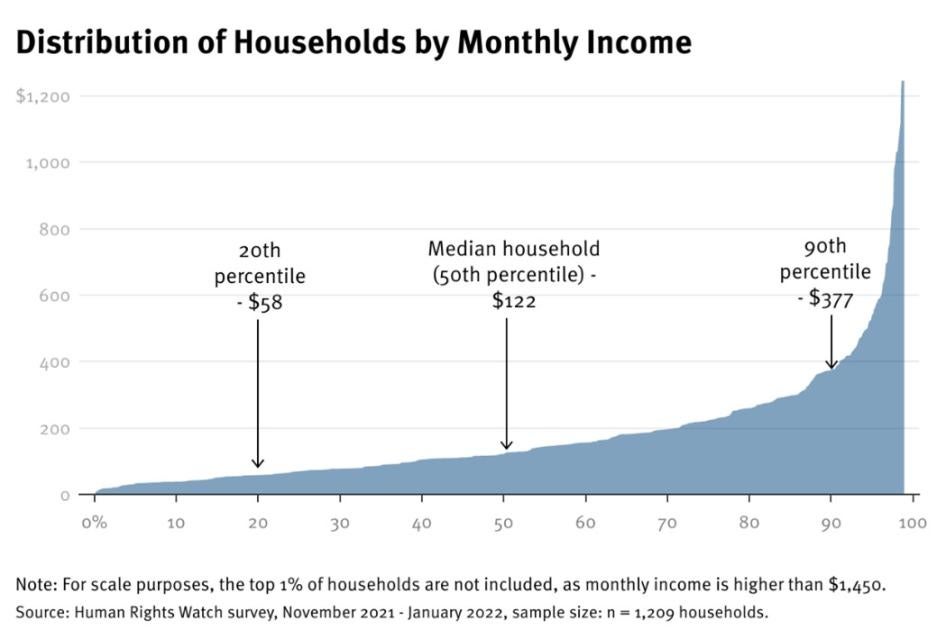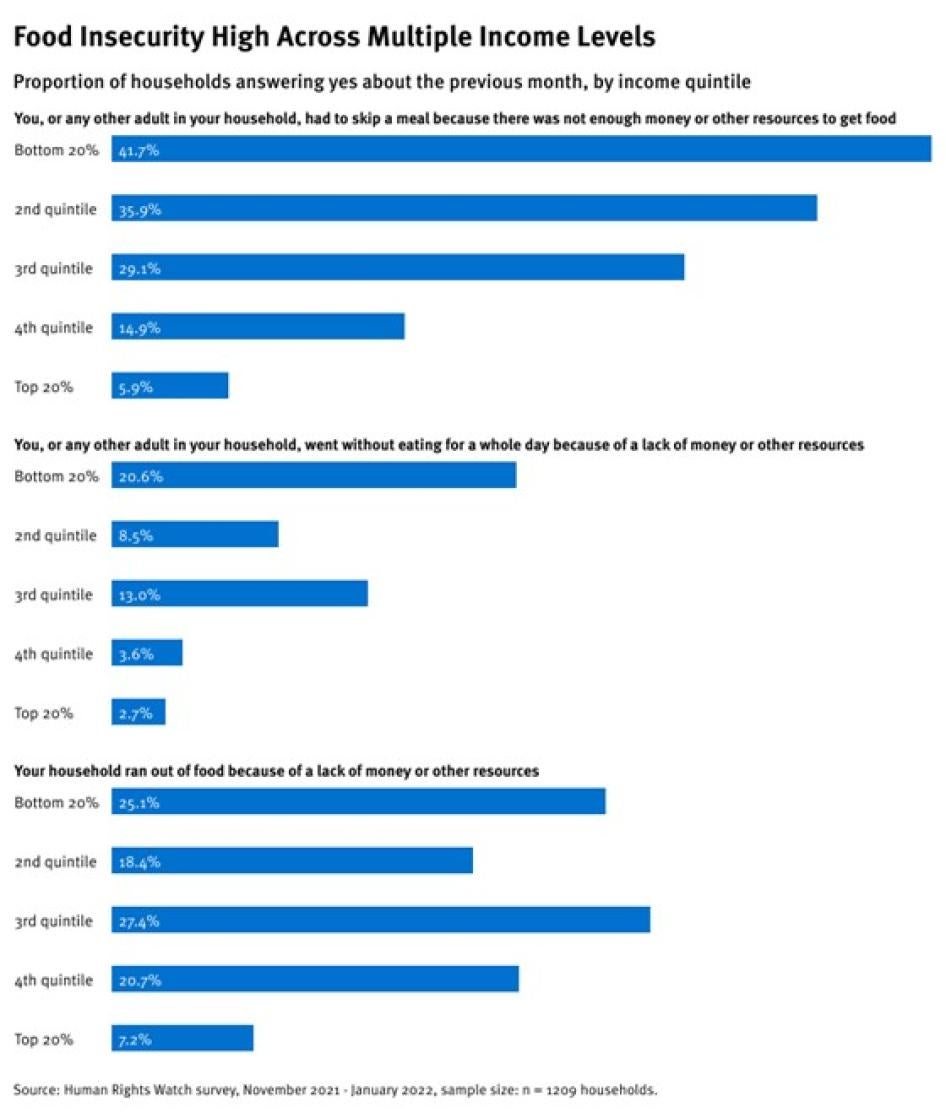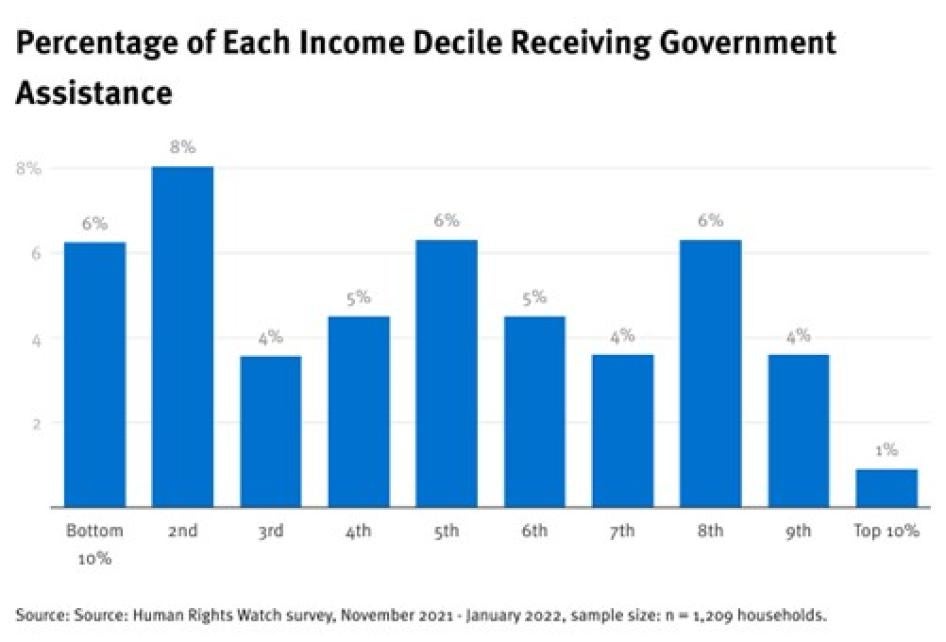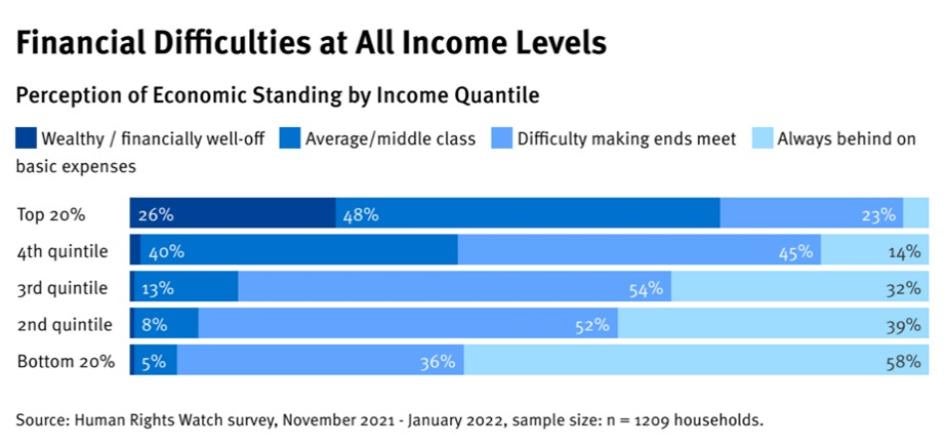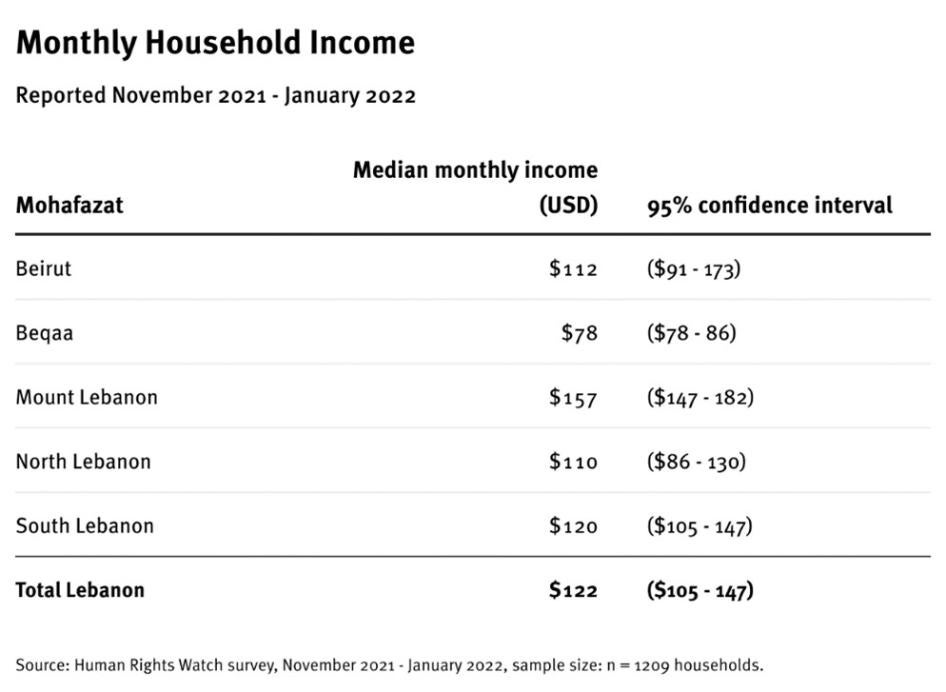The majority of people in Lebanon are unable to secure their social and economic rights amid a deepening economic crisis, with low-income households bearing the brunt, Human Rights Watch said today. Lebanon's national government and the World Bank should take urgent action to invest in a rights-based social protection system that ensures an adequate standard of living for everyone.
New research by Human Rights Watch has thrown light on the alarming levels of poverty and food insecurity in Lebanon caused by a decline in economic activity, political instability, and rising costs of living. The response of the authorities is failing to ensure everyone's right to an adequate standard of living, including the right to food. Universal social protection guaranteeing the right to social security for everyone in the country can help smooth economic shocks and ensure an adequate standard of living, including in times of crisis. But Lebanon's social protection system is highly fragmented, leaving most informal workers, older people, and children without any protection, and reinforcing social and economic inequalities.
"Millions of people in Lebanon have been pushed into poverty and have cut back on food," said Lena Simet, senior economic justice researcher at Human Rights Watch. "Three years into the economic crisis, the government has not acted sufficiently, and the existing system reaches an exceedingly small share of those with low incomes, leaving the majority entirely unprotected."
Existing social assistance programs, funded in part by the World Bank, have minimal coverage and very narrowly target households in extreme poverty, leaving large segments of the population who don't qualify vulnerable to hunger, unable to obtain medicines, and subject to other deprivations that undermine their rights such as the rights to food and health. The government has yet to adopt a national social protection strategy that guarantees the right to social security to everyone.
Between November 2021 and January 2022, Human Rights Watch conducted a representative survey of 1,209 households in Lebanon to gather information about people's economic conditions and their ability to afford food, medicines, housing, and education. Researchers asked households whether they receive financial or in-kind support from the government, religious or political groups, or nongovernmental organizations, and spoke with members of households about the impact of not having enough income.
The survey findings highlight the severity of the situation and indicate that the current social protection system is failing to meet the crisis for many people. Nearly 70 percent of households said they had difficulty making ends meet or were always behind on basic expenses in the previous year.
Yet, fewer than 5 percent of the households in Lebanon received some sort of government assistance. Households that included someone with a disability, female-headed households, and low-income households were more likely to struggle to make ends meet. People with the lowest incomes faced the most hardship, though households throughout the economic stratum struggled to cover basic needs. While nearly 94 percent of the lowest income quintile reported difficulty paying for essentials, 26 percent of those with the highest incomes also did.
Rising unemployment, a depreciating local currency, skyrocketing inflation, and the removal of subsidies for medicines and fuel have made it harder for many people to meet their basic needs. The survey found that nearly four out of five households had an earner who had lost employment since the crisis started in 2019, with about 15 percent remaining unemployed since. Households with a member who remained unemployed were more likely to face difficulty making ends meet.
The median household monthly income reported was just US$122 and inflation has continued to dramatically rise since the survey was taken. The average household size is four people including one child under 18. The share of those households living on extremely low incomes was high: nationwide, 40 percent of households earned approximately $100 or less per month and 90 percent of households earned less than $377 per month.
The severity of the ongoing economic crisis underlines the urgent need for a universal, rights-based social protection system that leaves no one behind, fulfilling everyone's right to an adequate standard of living and to social security that fulfills this right, Human Rights Watch said. Donors and the government should recognize the widespread suffering and devise a system to provide basic social security guarantees, such as child, disability, and unemployment benefits as well as old-age pensions, where the state has the responsibility to ensure that everyone has access to food and income security.
Poverty-targeted programs can play a secondary role in universal social protection systems as long as benefits that protect everyone from childhood to old age are guaranteed. But such programs should not be the foundation of an otherwise fragmented protection system.
The government could mobilize domestic resources to extend coverage and progressively reach universal social protection. For example, the United Nations estimated in 2020 that taxing the wealthiest 10 percent at the rate of 0.9 percent would alleviate extreme poverty as defined by the extreme poverty line, while a 3.6 percent rate would alleviate moderate poverty measured at US$14 per day purchasing power parity, a methodology that converts currencies into a common unit comparable across countries.
The right to social security is enshrined in both the Universal Declaration of Human Rights (UDHR) and the International Covenant on Economic, Social, and Cultural Rights. Article 25 of the UDHR states, "Everyone has the right to social security in the event of unemployment, sickness, disability, widowhood, old age or other lack of livelihood in circumstances beyond their control." Social security is key to securing other economic and social rights, particularly the right to an adequate standard of living, including the rights to food, medical care, clothing, adequate housing, and other necessary social services.
The UN Committee on Economic, Social and Cultural Rights has said that to fulfill the right to social security, countries are required to meet a minimum level of protection for those who need it and then progressively realize universal coverage and adequate levels of benefits over time.
Social security as set out in the ILO Convention 102 for the year 1952 requires member states to provide medical care, sickness benefits, unemployment benefits, old-age benefits, employment injury benefits, family benefits, maternity benefits, survivors' benefits for workers and their families, and other benefits.
The right to social security, including various forms of social protection, is also protected under other international human rights treaties to which Lebanon is a party, including the Convention on the Rights of the Child (article 26), the Convention on the Elimination of All Forms of Discrimination against Women (articles 11 and 14), and the Convention on the Rights of Persons with Disabilities (article 28).
"Establishing a well-designed social protection system fulfills important human rights obligations to an adequate standard of living and to social security," Simet said. "It creates a powerful tool to help reduce poverty and economic inequality."
Food Insecurity
The right to food is under severe threat in Lebanon across society, with the households saying that lack of money or other resources was the key driver of their missing meals or running out of food. In more than one out of four households an adult had to skip a meal because there was not enough money or other resources to get food. Twenty percent ran out of food in the previous month because of a lack of resources.
Low-income earners are especially food insecure. Forty-three percent of the households surveyed where an adult went a full day without eating were in the bottom 20 percent of income earners. Households with children and female-headed households were more likely than others to say that there was sometimes or often not enough to eat in the previous month.
Most strikingly perhaps, though, is that among the bottom 80 percent of earners, nearly one in five households said they had run out of food in the previous month.
Research by the United Nations suggests that the situation has not improved since Human Rights Watch concluded the survey in January. A June UNICEF survey found that as many as 70 percent of households borrow money to buy food or purchase it on credit. It said that more children are being sent to work to support their families, and young girls are married off to ease the financial expenses.
Government Assistance
Very few survey respondents said they received financial or in-kind support from the government. Fewer than 5 percent of households reported receiving any kind of government assistance, most of which was in-kind only. The 5 percent of households who received government assistance were spread throughout the income distribution. In fact, assistance does not appear targeted at the lowest earners. Rather than lower income households receiving aid at higher rates than others, between 4 and 8 percent of households in each income 10-percent range, other than the wealthiest 10 percent, received aid.
The Social Protection System
Lebanon's social protection system is a bifurcated model that provides social insurance for the better off and social assistance to those in extreme poverty, while excluding a large proportion living on middle or low incomes. Social insurance includes a set of contributory-based programs via the National Social Security Fund (NSSF) that are tied to formal employment in a labor market that is predominately informal so that many are not eligible for the program. The International Labour Organization estimates that in January 2022, informal employment reached 62.4 percent, an increase of 7.5 percentage points, from 54.9 percent in 2018-19.
The National Poverty Targeting Programme (NPTP), Lebanon's main social assistance program, receives technical and financial assistance from the World Bank. Despite alarming levels of food insecurity, coverage is low, with 3.5 percent of the population benefiting from the program, according to the program's own data. Eligibility is contingent on living in extreme poverty, which the World Bank defines in terms of minimal caloric requirements. Beneficiaries are identified through a proxy-means test, assigning households a score based on more than 40 variables including income, assets, housing quality, occupation, and demographic characteristics correlated with poverty. Social policy experts and the United Nations have critiqued the method for its high error rates, excluding hundreds of thousands of households from social assistance.
During the Covid-19 pandemic, the government initiated the Emergency Social Safety Net (ESSN) program, funded by a $246 million World Bank loan for three years, to expand the protection and provide social services to extremely poor households. Rollout of the program started in March 2022, with the aim of reaching 786,000 individuals, about 11.6 percent of the population, with cash assistance by 2025.
Beyond the social assistance programs targeted at people living in extreme poverty, the government provides almost no tax-financed guarantees for income security for informal workers, children, or older people. According to ILO data pertaining to the pre-crisis period (2018), about half (52.8 percent) of the population did not have access to any kind of social protection. A recent report by HelpAge International, a nongovernmental organization that supports the rights of older people, found that the lack of social protection for older people in Lebanon means that 80 percent depend on their families for financial support or rely on whatever savings they may have.
Despite high and rising inflation since 2019, Lebanon's minimum wage has not been updated since 2017, and currently stands at 675,000 LBP per month (only US$16.24 at market rates as of December 5, 2022). Informal work is not covered under national labor legislation and thus excluded from minimum wage protections. In 2021, the United Nations special rapporteur on extreme poverty found the minimum wage to be inadequate to afford basic items such as food and fuel, calling on the government to increase the threshold to levels that correspond to a living wage. The UN Committee on Economic, Social and Cultural Rights notes that the minimum wage "should be fixed with reference to the requirements of a decent living, and applied consistently."
The Human Rights Watch Survey and Interview Methodology
Human Rights Watch collected quantitative data through a household survey of a representative sample of 1,209 Lebanese households, partnering with a local research firm, the Consultation and Research Institute, to develop the research design and survey instrument. The institute conducted the survey.
The survey was carried out between November 2021 and January 2022. Informed consent about the purpose, use, and confidentiality of the survey results was obtained from each respondent. An anonymized dataset and the analysis code are available in a repository on the Human Rights Watch GitHub page. Human Rights Watch sought to survey households whose members had been living in the same home since at least 2019. The sampling frame therefore consists of households with only permanent residents who use the home as their permanent dwelling.
The sample is representative at both the national and the governorate levels. A probability proportional to size (PPS) methodology was used to determine sample size per governorate. Within each governorate, the sample was distributed by Caza and Circonscription Fonciere, which are both administrative units, also using the PPS method. The distribution was based on population sizes measured in the most recent national survey by the Central Administration of Statistics, the 2018 Labour Force and Household Living Conditions Survey.
Income responses were converted to USD by using the market exchange rate, not the official exchange rate, on the day of the interview. Inflation has continued at a high pace since interviews took place. Therefore, incomes in US dollars are even lower at the time of publishing (December 2022) than they were at the time of interviews.
Human Rights Watch researchers also conducted in-depth interviews with 31 residents in Lebanon about the economic crisis and food insecurity as well as academics and experts on the Lebanese economy and international financial institutions.
Poverty and Inequality in Lebanon
In a country where income and wealth inequality are among the highest in the region, academics and UN agencies have said that the economic crisis widened the gap, as middle- and low-income families' savings disappeared, and there was little opportunity for upward mobility.
Lebanon has a population of about 6.7 million people. The United Nations estimated in late 2021 that nearly half, approximately 3.28 million people, had been pushed into income poverty since Lebanon's economic crisis started in 2019. The situation worsened for others who were already struggling to fulfill their basic economic rights, including to food, education, or health care. An increasing number of adults skipped meals or were unable to afford medicines, and more children had to go to work to support their families. Adding to these circumstances, the ongoing war in Ukraine further pushed up the prices of staple foods and energy. Prior to the war, Lebanon received 80 percent of total wheat imports from Ukraine, and 15 percent from Russia, according to Lebanese customs figures.
The Human Rights Watch survey asked about monthly household income and placed households into income quintiles based on their responses. In each 20 percent range, except for the wealthiest, a majority of households stated that they had difficulty making ends meet or were always behind on basic expenses.
Four out of ten households in Lebanon earn less than $100 a month. Earners throughout the country are struggling, with the median income ranging from $78 per month in Beqaa to $157 in Mount Lebanon.
The result of low incomes and triple-digit inflation is that many people are unable to afford essential goods and services. Over 70 percent of households said they were always behind on basic expenses or having difficulty making ends meet. Of households with older people, 24 percent were unable to pay for support services in the past 12 months. Of households that include someone with a disability, 52 percent were unable to pay for support services. For households with children, over a third stated that they were having difficulty paying for school meals.
For years, Lebanon lacked official data on poverty, in part owing to the lack of census data since 1932, with nongovernmental organizations, international financial institutions, and United Nations agencies filling the gap. In March 2022, the government released the first multidimensional poverty index, based on 2018/19 household survey data on 19 indicators across five dimensions: education, health, financial well-being, basic infrastructure, and living standards. The assessment found that in 2019 - before the economic crisis - 53.1 percent of the population were living in multidimensional poverty.
Recent survey data suggest that living standards have severely deteriorated since 2019. The United Nations Economic and Social Commission for Western Asia estimates that multidimensional poverty increased from 25 percent in 2019 to 82 percent in 2021. Seventy-four percent of the population lived in income poverty, on less than $14 per day. The World Bank estimates that over half of the population lived below the national poverty line in 2020.
2021 Gallup poll data shows that nearly 9 in 10 people found it difficult, and 6 in 10 found it "very difficult," to make ends meet with their incomes. This figure has nearly doubled since 2019. More than half of adults say they lack money for food, a fourfold increase since 2018. Three in 10 people said they cannot afford shelter. More than 6 in 10 people said they would leave the country if they could.
Alarming Food Insecurity
Human Rights Watch found in its survey that food insecurity has reached alarming levels with many families including children going hungry regularly. In 1 out of 10 households, an adult went without eating for an entire day because of lack of money. In the bottom 30 percent of income earners, 30 percent or more households had an adult who had skipped a meal because of a lack of resources. The human impact of those statistics was starkly revealed in the interviews Human Rights Watch conducted.
A mother of five adult children and one minor said that her family rations food: "We only have lunch, we skip breakfast, and for dinner we have what is left over.... Food is getting more expensive."
One out of five households surveyed ran out of food in the previous month because of a lack of money. Another mother of five described a situation so dire that she wants to leave the country. "We're not getting food. Bread is now 10,000 LBP. I can barely afford it. I'm borrowing money to buy bread for the seven of us. Potatoes are 15,000 LBP and we cannot afford oil to fry the potatoes. All I want is to leave this country. I wish I can find someone who can take us away."
A woman, who lives in Beqaa, said, "In Lebanon you now have two options: either steal or starve. Thankfully, we have good neighbors, they help us with food, things like bulgur, rice. We cannot afford chicken or beef." Another woman describes the effects of not being able to afford foods: "I gave up everything - we don't know what juice (is), we don't know what fruits (are). Even during Ramadan, I didn't bring a single kilo of sweets or fruits or Qatayef [dessert served during Ramadan]. It does affect us. It affects my husband, my children, especially mentally. No one is helping us."
Social Protection
Social protection is defined as the set of policies and programs aimed at preventing or protecting all people against poverty, vulnerability, and social exclusion from childhood to old age.
Lebanon's social protection system is characterized by unequal levels of protection provided to various parts of the population and significant coverage gaps. Its flaws have been even more pronounced during the crisis. A 2022 study by The Policy Initiative, a Lebanon-based independent research organization, found that between 2019 and 2022, social protection spending was significantly skewed toward people who worked in the public sector - who received 69 percent of the social protection budget while only constituting one fifth of the labor force. In 2021, the special rapporteur on extreme poverty found that the social protection system has limited impact on poverty and inequality reduction.
The National Social Security Fund (NSSF) is the country's main social insurance mechanism and provides medical, educational, retirement, and family support programs to private formal sector and public sector workers. People working in the informal economy, estimated at 62 percent of the population in January 2022, are excluded from this program.
Only 11 percent of the social protection budget was allocated to social assistance programs. The National Poverty Targeting Programme (NPTP) is Lebanon's main social assistance program. The government initiated it in 2011 with technical and financial assistance from the World Bank. In addition to cash transfers, it provides a package of benefits that includes health, education, and food assistance to about 3.5 percent of the total population. Eligibility is contingent on living in "extreme poverty," and beneficiaries are identified through a proxy-means test, a poverty targeting approach.
The Emergency Social Safety Net was initiated during the Covid-19 pandemic as part of a crisis response to expand the poverty targeting program. The cash assistance program is funded by a US$246 million World Bank loan for three years, though just one year of cash transfers are financed via the loan. The loan was approved by the World Bank board in January 2021, with rollout starting in March 2022. The program provides $20 per month per household member, in addition to a flat amount of about of $25 per household. It also covers the direct costs of schooling for 87,000 children between the ages of 13 and 18 to prevent school dropouts.
Nearly 1.6 million people registered for the benefits within the first weeks, although benefits will only be provided to 150,000 households (approximately 786,000 people) using the poverty means test targeting methodology to identify eligible households. Combined with the poverty targeting program, the emergency program aims at reaching 27 percent of the population by 2025, about 197,000 households. However, as of September, only about 75,000 households had received assistance through the program. Funding for the program has only been secured for one year.
In June 2021, the Lebanese parliament approved the ration card law for a $556 million program to support vulnerable households affected by the lifting of subsidies. As of November, the ration card has not been rolled out, in part because it lacks funding.
In addition to high exclusion errors, Lebanon's social protection system categorically excludes several groups of the population. Studies by the Centre for Social Sciences Research and Action, the ILO, the Policy Initiative, and the special rapporteur on extreme poverty find patterns of exclusion linked to work status, class, gender, citizenship, resident status ethnicity, and other social characteristics, such as disability or age. Refugees and asylum seekers from Palestine and Syria are not eligible for any of the social protection programs.
The Human Rights Watch survey found that only 5 percent of households reported receiving any sort of government assistance. Numerous interviews revealed frustration with a lack of response to assistance applications.
"Nobody else is helping," a 54-year-old woman who lives with her sick mother said. They applied for government assistance, to no avail. "We're not even getting food aid. I signed up for the ration card but no one helped. The [ration card] application was straightforward, I don't think the questions were difficult. At the end I got an SMS confirmation. I was happy, I thought someone is going to help, but no one did. I think they are liars. I think they're playing us."
A 50-year-old woman who lives with her brother agreed:
No one offered us any help, no one at all, no one knocked on our door. My brother has a disability card from MoSA [the Ministry of Social Affairs] and they have not provided any assistance, none whatsoever. He carries their card and it's as if he doesn't - they do not help. I applied for the ration card in October 2021 but so far nothing. No one called, no one visited.
A 33-year-old Syrian woman described the assistance provided by third parties: "We only get assistance from the United Nations as refugees, it's a monthly assistance to purchase food, they provide money, and we use the funds to buy food."
Others said it was difficult to understand what aid is available or the application process. For example, a woman, who lives in Tripoli where she sells food she cooks at home, said that it is difficult to learn about programs because electricity shortages limit access to media. "I didn't sign up for the ration card," she said "I don't even know what it is.… In the news? We don't have electricity to even watch the news."
A 75-year-old man who lives with his wife and one of their daughters in Bechara-el-Khoury, said:
I did apply for the ration card and now we're waiting. It's been several months now, I can't remember exactly when. My neighbors helped me apply. I could not have done it on my own because I do not have a mobile phone, only a landline. I don't know how to use smartphones. If it weren't for them, I would not have been able to apply. I don't know how to use the platform and how to fill it - it needs technical skills.
A 42-year-old woman in Jnah, where she works as a cleaner, said:
No one is helping us. I filled out the ration card application, around a year ago. There's a teacher … he helped me and he did it all and took the picture very quickly. I could not do it on my own because it's difficult online. I got a confirmation text but haven't received any aid.
Several interviewees said they successfully received government aid for food. "I had applied in person two years ago," a 52-year-old man who lives in Tebbaneh said. "I've been receiving assistance for four months through the card. The amount is exactly $115 and we spend it on food. Nothing other than that." A 55-year-old woman, who lives with her five children in Saida said: "We've been getting $115 for around three months. They provide $15 for each child. It's to survive - we use the amount to do medical check-ups and to feed the kids. The amount barely lasts for the entire month."
Without an adequate state-provided social protection system, many people in Lebanon rely on assistance from private or religious groups. A study by the Arab NGO Network for Development describes these structures as "informal security regimes," through which households in need receive shelter, food, or employment. Several people interviewed reported having received food or cash assistance from UN agencies, humanitarian actors, or religious groups.
The Problems with Narrow Poverty Targeting
Proxy-means tests (PMT) attempt to identify eligible households based on their perceived economic status by analyzing various data points to estimate household income. They use statistical analyses of household surveys and observable household characteristics, such as demographics or ownership of durable assets such as televisions or other household property. UNICEF, the ILO, and social policy experts have critiqued the PMT for its high exclusion error rates. A 2020 study by Kidd and Athias of PMTs in 19 countries found that targeting errors varied between 29 percent and 96 percent.
Reports by the ILO, Development Pathways, and the Australian government have detailed the ways in which the methodology for these tests is inherently inaccurate. Fundamentally, the method makes the false assumption that certain household characteristics and assets can be used as a proxy for household consumption, and therefore poverty, because they are correlated. Yet studies have found that these correlations are imperfect and so the models built on them are weak predictors of true consumption and poverty. Such tests used in lower and middle-income countries only explain around half of the variation in consumption between households, which means that they only weakly predict a household's level of poverty.
Not only are the correlations between proxies and poverty imperfect, but the methodologies for gathering data via social registries have limitations too. Surveys are costly and difficult to carry out. Household composition, income, and consumption are highly dynamic, yet the targeting surveys are undertaken infrequently. As a result, their accuracy degrades rapidly, introducing further errors into the targeting process. In Lebanon, for example, the household survey behind the poverty targeting program's poverty means test was conducted in 2011.
Finally, studies find that poverty-targeting can create animosity between beneficiaries and non-beneficiaries and weakens social relations. This is particularly the case where there is little difference in living standards between beneficiaries and non-beneficiaries.


